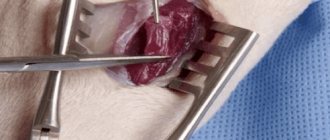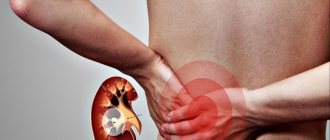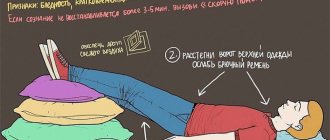An important indicator of a biochemical blood test is creatinine. This amino acid is formed in muscles after the non-enzymatic breakdown of creatine, a substance involved in the energy metabolism of the muscular system. The concentration of creatinine in the blood, with proper functioning of the muscular system and kidneys, is always maintained within certain values.
Deviations from the norm indicate a violation of the process of elimination from the body. The problem arises with kidney pathologies and impaired energy metabolism in the muscles. Understanding what creatinine is in the blood, the doctor can prescribe additional tests to make an accurate diagnosis in order to carry out the correct treatment.
Acute renal failure
This is a nonspecific syndrome that occurs with acute loss of homeostatic functions of the kidneys. Symptoms are pronounced and appear suddenly. The volume of urine excreted stops or sharply decreases. Toxic substances are not removed from the child’s body; intoxication occurs with metabolic products. Within a few days, symptoms resembling poisoning appear - the child becomes lethargic, feels sick or vomits. Source: O.I. Andriyanova, F.K. Manerov, Yu.A. Churlyaev, I.G. Khamin Causes and treatment of acute renal failure in children // General resuscitation, 2007, III, 4, pp. 70-75
Why does the disease occur and how does it progress in children of different ages?
On the first day, the newborn may not urinate; a sign of pathology is the absence of urine on the third day. Features of the physiological structure of the kidneys in the neonatal period do not allow us to determine the disease in infants in the first two days. Source: Iseki K., Ikemiya Y, Iseki C., Takishita S. Proteinuria and the risk of developing end-stage renal disease // Kidney Int. 2003; 63:1468-1473
During the newborn period, problems may arise for the following reasons:
- low birth weight;
- developmental anomalies, heart defects;
- congenital vascular diseases of the renal arteries;
- absence of kidneys;
- urinary tract disorder;
- blood infection;
- dehydration due to intrauterine infection;
- birth trauma with blood loss;
- acute lack of oxygen during labor;
- blockage of the renal vein.
In children from 1 month to 3 years, problems arise against the background of acute intestinal pathologies, kidney infections, hemolysis, and metabolic disorders.
The causes of acute renal failure in children 3-14 years old are: severe injuries, drug poisoning, infectious diseases, the presence of stones or tumors that block the bile ducts.
Stages of development and symptoms
- Preanuric – urinary function worsens. Weakness, pallor, lethargy, lethargy appear, swelling is visible (nephrotic syndrome), diarrhea, shortness of breath, and rapid heartbeat are observed.
- Anuric – lasts 10-14 days, toxins and metabolic products are not removed from the body, salts and water are retained. The acid-base balance is disturbed, and acute intoxication with metabolic products develops. There is severe thirst, an unpleasant taste in the mouth, and loss of appetite. Muscle tone decreases, peeling of the skin is visible.
- Polyuric – sharply increases urine output. The child is in serious condition, there is drowsiness, swelling, headache, nausea. Dystrophy of the heart muscle develops. An urgent kidney transplant is required.
- Restorative - blood vessels return to function, urine volume and capillary permeability are normalized.
How is diagnosis carried out?
The main symptom of acute renal failure in children, by which pathology can be suspected, is a sharp reduction in urine volume. To confirm the diagnosis, urine and blood tests are necessary.
In acute renal failure the following is observed:
- decreased specific gravity of urine;
- increase in urea, creatinine;
- increased levels of sodium salts.
Additionally, ultrasound of the kidneys, cystoscopy, and radiography are performed.
Important Notes
Material for research
Capillary blood
Children under 7 years of age: venous blood/capillary blood (for special indications). Children over 7 years of age and adults: venous blood. Capillary blood collection for research is carried out only for children under 7 years of age (for special indications)! According to GOST R 53079.4-2008, indications for taking capillary blood are possible: in newborns, in patients with very small or hard-to-reach veins, with large-area burns, and in severely obese patients.
Chronic renal failure
Pathology develops if the acute form is not treated. Chronic renal failure is a condition in which anemia is observed, phosphorus-calcium metabolism is disrupted, and blood pressure increases. The cause of chronic renal failure in children can be poisoning with drugs and heavy metals, untreated infections and diseases of the urinary system:
- pyelonephritis;
- scleroderma;
- arterial stenosis;
- amyloidosis;
- hereditary nephritis;
- tumors, kidney stones.
In children under 3 years of age, the development of the disease is often caused by abnormalities in the development of the urinary tract, heredity, and renal tissue dysplasia.
The causes of chronic renal failure in children over 10 years of age are acquired diseases: organ damage due to tuberculosis, diabetes mellitus. The risk group includes children with intrauterine development disorders and obstructive diseases. Source: T.I. Razdolkina Features of chronic renal failure in children // Difficult Patient, 2013, No. 2-3, v. 11, pp. 16-20
Stages of development of chronic renal failure
- Compensated – no complaints.
- Subcompensated – accompanied by increased thirst, decreased appetite, and disruption of the gastrointestinal tract. CRF manifests itself in growth retardation, severe intestinal infections, dry skin and peeling.
- Decompensated – a noticeable decrease in urine volume. Signs include poor appetite and nausea. In children, curvature of the legs is noticeable.
- Terminal – damage to organs and systems, requiring transplantation or dialysis. Swelling of the face and lower extremities, headaches, lack of appetite, decreased vision, shortness of breath, itchy skin. There is a sharp lag in growth.
What is a good creatinine level?
In most cases, the normal range of creatinine found in the blood for people with healthy kidneys is:
| Age/gender | Normal blood creatinine value |
| Newborn babies | 20 - 75 µmol/l |
| Under 1 year | 15 – 37 µmol/l |
| 1 – 3 years | 21 - 36 µmol/l |
| 35 years | 26 - 41 µmol/l |
| 5 – 7 years | 27 - 51 µmol/l |
| 7 – 9 years | 34 - 52 µmol/l |
| 9 – 11 years | 33 - 66 µmol/l |
| 11 – 15 years | 45 - 75 µmol/l |
| Over 15 years old Men Women | 60 – 105 µmol/l 42 – 80 µmol/l |
Treatment of the disease
In the acute form, when there is severe intoxication of the body, emergency medical care is necessary. It is necessary to call an ambulance for hospitalization and detoxification measures. Doctors wash the stomach and clean the esophagus with enterosorbents. In case of a threat to life, hemosorption or hemodialysis is performed. Treatment of chronic renal failure in children is carried out to restore kidney function and slow down pathological processes. The course is compiled individually, taking into account the cause and condition of the patient. Depending on the form of the disease and the clinical picture, medication or active treatment is prescribed. No one can answer the question of whether a child will outgrow chronic renal failure; it is necessary to follow the instructions and monitor the state of glomerular filtration.
Conservative methods
Therapy includes:
- low protein, salt-free diet;
- diuretics to increase urination;
- hormones;
- stimulants to relieve anemia;
- medications to regulate blood pressure to prevent the development of heart disease; medications to reduce stomach acidity;
- vitamin D and calcium to prevent renal degeneration.
Active methods
If medications do not help, therapy using special devices is indicated to prevent relapses and maintain vital functions.
- Hemodialysis is hardware blood purification using an “artificial kidney” device. During the procedure, toxins are removed and the water-salt balance is restored. A visit to a dialysis center is required.
- Peritoneal dialysis purifies the blood and restores balance by filtering it through the abdomen. The procedure is carried out at home.
- Kidney transplant. The operation increases the duration and improves the quality of life.
Creatinine is higher than normal - reasons
Physiological reasons:
- strength sports – powerlifting, bodybuilding, wrestling;
- large amount of muscle mass;
- predominance of meat dishes in the diet;
- the use of certain medications, for example, tetracycline antibiotics, non-steroidal anti-inflammatory drugs.
Pathological reasons:
- acute and chronic kidney diseases;
- diseases of the cardiovascular system;
- hyperthyroidism – excessive production of the hormone thyroxine by the thyroid gland; radiation sickness;
- oncological diseases;
- muscle injuries;
- septic shock;
- extensive burns;
- endocrine diseases.
Consequences and complications
If diagnosis is not made in a timely manner and treatment is incorrect, serious complications can occur. The development of the disease leads to a reduction in renal function, disruption of systems and organs, poisoning by metabolic products, and irreversible consequences.
Among the dangerous complications:
- risk of cardiac arrest;
- dysfunction of several body systems;
- blood poisoning;
- uremia.
If there is a pathology, the child is developmentally delayed, does not fit into the team well, and has difficulties in developing speech.
Complexes with this research
Examination during pregnancy.
1st trimester 10,390 ₽ Composition For those at risk of COVID-19 Diagnosis of diseases complicating the course of coronavirus infection 2,590 ₽ Composition
Kidney screening Screening for kidney dysfunction 710 RUR Composition
IN OTHER COMPLEXES
- Female infertility RUB 9,790
- Biochemistry of blood. 8 indicators 990 ₽
- Diabetes monitoring RUB 1,900
- Kidneys. Extended examination RUB 1,180
- Pregnancy planning. Clinical indicators RUB 3,880
Prevention in children
Parents' attentive attitude to the appearance of the first signs allows the disease to be completely cured without consequences. Clinical recommendations for the prevention of chronic renal failure in children:
- treat and follow-up kidney diseases (pyelonephritis);
- Healthy food;
- do not take medications unreasonably;
- do not abuse folk remedies.
If you suspect a pathology, you should immediately consult a doctor. To prevent congenital diseases, the expectant mother should adhere to a healthy diet and lifestyle.
Sources:
- O.I. Andriyanova, F.K. Manerov, Yu.A. Churlyaev, I.G. Hamin. Causes and treatment of acute renal failure in children // General resuscitation, 2007, III, 4, pp. 70-75.
- T.I. Razdolkina. Features of chronic renal failure in children // Difficult Patient, 2013, No. 2-3, v. 11, pp. 16-20.
- Iseki K., Ikemiya Y, Iseki C., Takishita S. Proteinuria and the risk of developing end-stage renal disease // Kidney Int. 2003; 63:1468-1473
The information in this article is provided for reference purposes and does not replace advice from a qualified professional. Don't self-medicate! At the first signs of illness, you should consult a doctor.
How to make an appointment with a pediatrician
Examination of children, collection of anamnesis and prescription of tests is performed by the pediatrician of JSC "Medicine" (clinic of academician Roitberg). You can figure out why your child’s creatinine is low or high, and you can examine the current state of health at an appointment by making an appointment by phone: +7 (495) 995-00-33. The clinic is located at the address: Moscow, 2nd Tverskoy-Yamskaya lane, building 10. This is the center of Moscow, so there are many metro stations nearby: Mayakovskaya, Chekhovskaya, Tverskaya, Belorusskaya, Novoslobodskaya. If you wish, you can make an appointment on the website of JSC “Medicine” by filling out the “Make an appointment with a doctor” form. You must provide your contact phone number and name. After this, a call will be received from the clinic to coordinate the date and time of the appointment.
Prices
| Name of service (price list incomplete) | Price |
| Appointment (examination, consultation) with a neurologist, primary, therapeutic and diagnostic, outpatient | 1750 rub. |
| Consultation (interpretation) with analyzes from third parties | 2250 rub. |
| Prescription of treatment regimen (for up to 1 month) | 1800 rub. |
| Prescription of treatment regimen (for a period of 1 month) | 2700 rub. |
| Consultation with a candidate of medical sciences | 2500 rub. |
| Transcranial duplex scanning (TCDS) of cerebral vessels | 3600 rub. |
Value Normalization Methods
The choice of therapeutic measures will depend on the factor that caused the decrease in enzyme concentration. In most cases, the main solution to the problem is to increase muscle mass.
Drug therapy
If the cause of the development of the pathology is any disease, then, based on diagnostic studies, the specialist will prescribe appropriate treatment with drugs. Only after the underlying disease is eliminated, the creatinine level will gradually return to normal.
Diet
In the absence of pathologies, first of all it is necessary to reconsider the diet. However, it should be borne in mind that the diet is not associated with the treatment of any serious disease (gout, pancreatitis, etc.).
It is recommended to include more high-protein foods in your daily menu.
Be sure to include in your diet foods such as:
- river and sea fish;
- meat products;
- nuts;
- seafood.
In some situations, when it is necessary to increase the enzyme level in a short time, the attending physician may advise taking special vitamin complexes, which in this case contain all the necessary microelements and substances.
ethnoscience
To normalize these indicators, patients often turn to folk remedies that help increase the level of creatinine in the blood fluid. It should be remembered that such treatment is possible only after consultation with a doctor.








